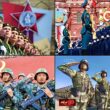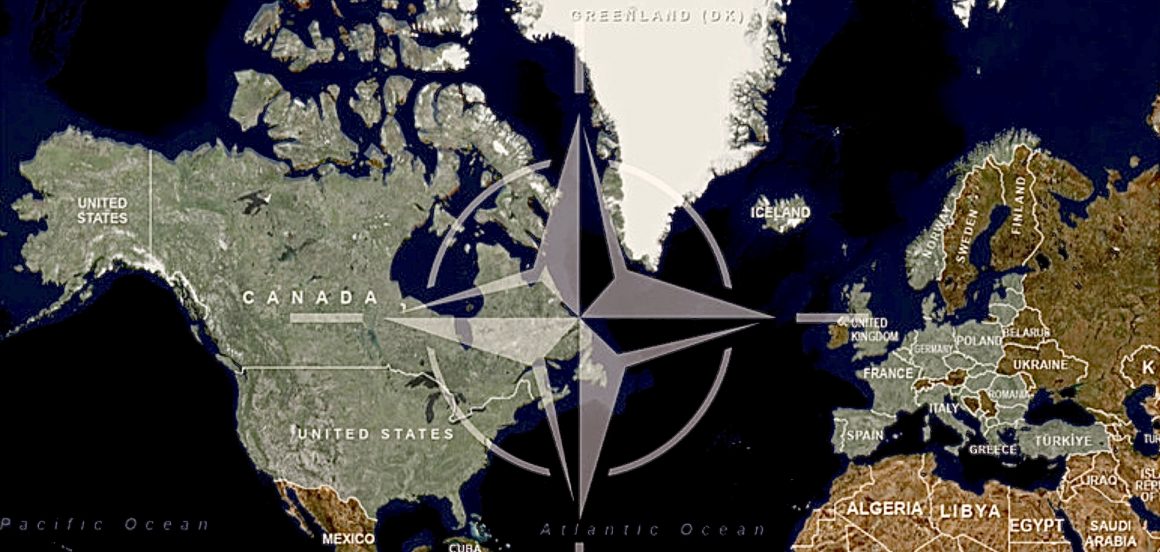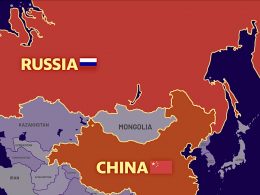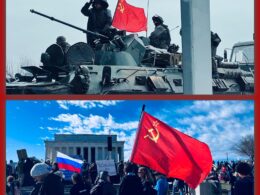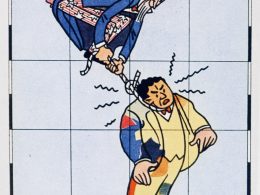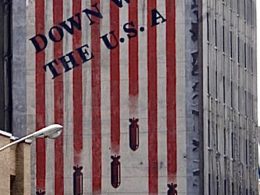The U.S. ruling class has opened up a chasm for the people within the country, as well as within the wider NATO bloc. It’s brought about a combination of international, economic, health, and climatic crises that are going to end in political nightmare. And it’s rendered the populace unaware of how to avert what’s coming, or how to bring themselves out of the abhorrent conditions they’re already living under. For as long as this revolutionary knowledge remains out of reach, they’ll continue being shuffled along towards their dark fate. This is the fate that our socioeconomic system has always had planned for them. Capitalism was always going to eat itself when it became faced with its own collapse.
The people are acutely aware that the situation is dire. With the prices that won’t stop rising, the wages that aren’t keeping up to the effect that workers have collectively gotten a pay cut in recent months, the police who resemble an army more every year, the deterioration of infrastructure, and every other piece of evidence that our social order is breaking down, it’s impossible to believe otherwise. This consciousness of a perilous systemic sickness is shared by the elites, who see how profoundly capitalism has deteriorated and seek a route towards preserving their power. They’re troubled not just by the potential for revolt, but by the accelerating disappearance of the America-centered global order that they depend on for the continued health of their capital. There’s a reason why the United States, the core of imperialism, has been most aggressive out of all the imperialist countries in imposing neoliberal austerity onto its people: the imperial spoils have been drying up for decades, and growing amounts of the empire’s own population need to be sacrificed to compensate for this loss.
The bigger this deficit gets, the more desperate the empire is to reverse the flow of history. To carry out some masterstroke in geopolitics that destroys China as a superpower, and ends the threat to neo-colonial extraction posed by the Belt and Road Initiative. The events that would need to occur for this to happen, which include the destabilization of Russia, the ousting of Assad within the crucial Eurasian trade node of Syria, and Ukraine-style coups throughout the central Asian countries, are nothing more than fantasies. Washington has shown itself to be too far along in its decline to be able to inflict those kinds of damage. It hasn’t even been able to subdue Syria. When Biden establishes “red lines” for China at the G20 summit, he’s doing so not from a place of dominance, but from a place of desperation. The decoupling and trade protectionism that the U.S. has carried out in regards to China are measures that further render Washington, and its closest allies, hermetic global anomalies.
The USA, Canada, Britain, and some countries in Europe and Scandinavia are the main powers to still not have China as their biggest trading partner. Almost every other country has switched to the PRC as their economic anchor. Without its former trading hegemony, and soon to lose its currency hegemony as well, the U.S. is naturally abandoning its old semblance of respect for international law. In a trend that began over a decade prior to the global trade shift, Washington has been vastly expanding its global secret wars. Since the “War on Terror” began, it’s carried out operations in dozens of countries, opening up new occupation fronts like AFRICOM and training local paramilitaries. All of this has come about through its own legislature’s authorization, not through the sanction of any international body.
The world no longer has reason to lend the USA the respect afforded by diplomatic and economic cooperation, and consequently no longer has reason to fear the USA’s hand on the level it used to. By the middle of the century, the empire may not be able to coerce any country through means other than brute force. Without success for its psyops across the Global South, Washington lacks the strength for another wave of counterrevolutionary coups. It can only find support for its war against Russia from the other imperialist powers, which themselves increasingly have a rational incentive to break from the costly sanctions. Without its global economic grip, which will finally break in full if the dollar gets abandoned as the global reserve currency, Washington can no longer exercise the “soft” power that let it become the largest empire in history. Washington has become an increasingly rogue state.
The nature of imperialist warfare in the 21st century, therefore, can only be one of maintaining a stubborn grip on all the places which imperialism is still able to reach. Assad hasn’t been defeated, but the occupying U.S. troops still aren’t able to be kicked out of the country. They’re still stealing oil from Syria, and still using sanctions to frustrate the rebuilding effort. This isn’t victory, anymore than the twenty years of vainly trying to fight off the Taliban were victory or anymore than the parallel drawn-out Ukrainian counterinsurgency will be. But it lets the empire continue to exist, if in a contracted form where it can no longer maintain a pampered labor aristocracy in the core. And however far this contraction goes, as long as revolution in the core doesn’t happen, the ruling class can remain in power.
If our society’s decline were to advance to the point where the United States resembles post-Gaddafi Libya, in which slave markets have emerged out of a failed state, the elites would still be able to rule. Even if only in a crude sense, where vast swaths of the population are living in anarchic destitution while the wealthy’s enclaves are the only functioning locales. Neoliberalism, which has in effect been an engineered collapse of society, is the preparation for that scenario.
What’s required for such a project, where the system holds on even after it’s ceased to be “capitalism” as we’ve known it and reverts to a new feudalism, is the importing of imperialism’s methods for neo-colonial rule. This process has already been in motion for over a generation, since the bourgeoisie imposed neoliberalism onto not just the peripheral countries but the core ones as well.
With the rise in inequality has come police militarization, mass surveillance, a war against whistleblowers, detentions of “terrorism suspects” without trial, online censorship of information that goes against imperialism’s narratives, towers that monitor everyone outdoors within several miles, border militarization, covert incorporation of intelligence into the media, corporate encroachment upon electoral systems, and other developments that are analogous to the destruction of democracy which occurred throughout much of the Global South during the Cold War. Mercenaries that act as domestic police forces are a recent addition to the list. The difference between this and the past bourgeois dictatorships is that these means for repression have modern technology’s advantage. They have the internet’s all-encompassing surveillance opportunities, and artificial intelligence systems that enable a surgical monitoring and ideological management of each individual.
Yet these measures are only sufficient for as long as the imperialist bloc remains united. The restoration of inter-imperial unity brought by the Ukraine conflict is only temporary, a new emergence of division within NATO is coming. This will happen whether through the political extinction of the European leaders who go along with the sanctions, or through the breakout of civil conflict across the eurozone. These places will ultimately have to break from the empire in order to have hope for avoiding becoming failed states. Which they already have become, in terms of their failure to provide essentials to their people. As this breakdown unfolds, the empire will implement the next step in its campaign for keeping control: the “Syrianization” of Europe, and then of the imperial center as well.
—————
Syria is only one example that can be used to illustrate what Europe’s future looks like. In every country and region that’s embraced the multipolar order, the U.S. has tried to frustrate the transition away from imperial control. It’s done so through the dual strategy of destabilization and militarization. Washington’s meddling in Africa, Latin America, and southeast Asia has come along with military occupations wherever possible within these sections of the globe. It can’t restore the U.S.-led order, but it can prevent imperialism’s challengers from accessing the disputed markets. Even if these markets have been rendered nonexistent by the destruction of a functioning state.
This is the purpose of the paramilitary training facet within Washington’s secret wars: to cultivate terrorist organizations like Ethiopia’s TPLF, which exist to sow chaos so that the BRI’s implementation can be delayed. The new generation of Mujahideen in Afghanistan, and the Afghan Uyghur terror groups that seek to make their violence spill over into the Xinjiang border, are other examples. Washington’s hope is that the famines these countries are experiencing, exacerbated by U.S. sanctions, will provide the conditions for a full dynamiting of their state structures. When a state can no longer be controlled, it must be destroyed. From this campaign to sow chaos is emerging a band of the globe that’s engaged in anarchic warfare, stretching from civil conflict-ridden Myanmar, to violently divided Libya, to gang violence-plagued Central America.
All of these places remain unstable due to imperialism’s meddling, and they can only become functional if imperialism’s hand grows too decrepit to inflict harm. Which can’t happen until revolution comes in the imperial center itself. Washington’s latest operation to occupy Haiti, which is predicated on stopping the country’s chaos but is truly about propping up the current neo-colonial regime, shows imperialism still has the strength to force colonialism’s victims into continued subordination. If Washington’s hand becomes utterly ineffectual by mid-century, it will be because revolution has come to its own borders. Not because imperialism has stopped fighting to perpetuate oppression, which it will never do. It’s applying a shock treatment to growing swaths of the globe, made more effective by the climate crisis, with the hopes of putting them all in northeastern Syria’s situation. This is a situation where the area is subject to U.S. occupation and looting, even if it technically exists in the borders of an anti-imperialist government. If the state can be destroyed in any location, imperialism can still gain a foothold there.
It was only logical that this treatment would be applied to Europe, as well as to the U.S. itself, when these places came under threat of falling from the grip of America’s ruling class. Destroying a state is a way of preempting the variables the ruling class fears, whether those variables are proletarian revolution or an attempt by foreign leaders to assert their own interests. Should Washington’s destabilization operations become fully applied to multiple European states, the humanitarian crisis that they’re experiencing from the Russia sanctions will be a sufficient spark for civil conflict.
Germany is the first candidate for this pacification measure. It’s the European state that’s experiencing so far the most substantial debate within its ruling class over whether committing to the Ukraine war is worthwhile. And even as it for now remains a solid vassal in Washington’s anti-Russian war machine, it’s opened up economic ties with China. As a consequence, even since before the war, Germany has been a target of the first stages in the Syrianization process. These are the calls from U.S. ambassadors for Germany to go against its own interests by abandoning the Nord Stream pipeline, and the implied coercive measures that intimidate Germany’s leaders into trying to balance their allegiances.
With this fall’s engineered explosion of the pipeline, the effort to pacify Germany has become more threatening, if indirectly. Industrial sabotage, preferably of the kind that can be blamed on the enemy or switftly made an afterthought in media discourse, is one of the many tools Washington is going to employ in its war against Europe. For as long as possible and wherever possible, this war will have to be covert. And the empire wishes this war weren’t necessary, as attacking its own allies signals the demise of its international order. But this war has started, and it will expand and intensify as multipolarity continues to rise.
The war’s next stage will be the application within Europe of Washington’s more direct tool for waging asymmetrical warfare, beyond economic attacks or orchestrated blasts: the use of paramilitary operatives. In Ukraine, the U.K.—which has continued to be Washington’s most loyal European partner in waging war since it broke from the EU—is using terrorism as a propaganda weapon. Its intelligence centers are sending contractors to wage information warfare through a dual strategy of censorship and propaganda, the latter of which takes a form that depends on terror and war crimes. These contractors, informed by a psychological operations doctrine that takes direct example from the propaganda methods of ISIS, are working to shoot snuff films wherein Ukrainian forces torture Russian prisoners of war. Their aim is to to identify the demographics and sentiments of the Russian populations they target, so that they can demoralize these targets on a mass scale. Their method is to expose these Russians to the footage of the atrocities.
In practice, this can only rouse support for Russia’s mobilization, not discourage it. But provoking Russia has been Washington’s strategy for decades, ever since U.K. intelligence foresaw after the Soviet breakup that Russia and Ukraine had new potential for conflict. Functionally, the purpose of these operatives is to incentivize the terror carried out by the U.S. mercenaries, CIA-backed fascist militias, and regular armed forces members within Ukraine. When Ukraine becomes spent as a tool for trying to destabilize Eurasia, these fighters will largely be assigned to the war’s new front, the front in which its imperial destruction gets turned inwards.
They’ll become émigrés to other European countries, and even to the U.S. as well, working to suppress the civil unrest which these places will be undergoing. The more the war accelerates the economy’s decline, the more their services will be needed. Already during this moment, where Europe is experiencing a combination of sanctions-created energy crisis and winter cold extremes exacerbated by climate collapse, civil conflict is becoming a serious possibility. The refugee influx from Washington’s wars has created the conditions for clashes between Europe’s far-right groups, and the immigrant communities which have been routinely rioting due to their disenfranchisement. The British intelligence operatives in Ukraine, who’ve gathered their counterinsurgency knowledge from their involvement with terrorist groups in both Syria and the U.K., will take advantage of this increasingly tumultuous social landscape. Europe is on its way to becoming Syrianized, both through the proliferation of U.S. military installations and through the establishment of a U.S.-U.K. network for manufacturing chaos.
This war has accelerated the decay of every member of the imperialist bloc. Whether the European countries remain U.S. vassal states, or opt for inter-imperialist warfare out of rational self-interest, their descent into failed state status is inevitable. Capitalism’s growing contradictions will, on their own, ensure the collapse of these societies. The same applies to capitalist Russia, though the Russian Federation will outlast the U.S. empire given the economic war’s current trends. The only way these countries will see an end to their crises is by all undergoing proletarian revolutions, allowing them to become politically and economically self-sufficient while militarily defending themselves from the imperialist remnants.
There’s a reason why there are societies around the globe, including in countries like Britain, dedicated to the study of the DPRK’s Juche model: because Juche’s military first, self-reliant strategy of anti-imperialism lets any given country fulfill these criteria for surviving imperialism’s onslaughts. Until the workers gain power in this way, or in an equivalent way to it, the crises plaguing our world will persist. This especially applies to Ukraine, which can’t adequately be denazified until the socioeconomic forces that produce fascism are eliminated. Operation Z is revolutionary in the current context, as it’s anti-imperialist. But it’s not ideal. Ukraine and the other former eastern bloc countries that have been descending into fascism can’t be healed until the Soviet Union gets restored.
The great obstacle to this vision for a wave of socialist revolutions across Europe and North America is that even as capitalism reduces the peoples in these countries to serfs, they’re more ensconced than ever in anti-communist, pro-imperialist propaganda. This is truest in the imperial center, as per the material interests of its ruling class. Not even in a loyal pro-American country like Poland are the people as willing to accept NATO propaganda as Americans are. They live in a self-reinforcing loop, where the same ideas get perpetually repeated.
Bringing somebody out of this indoctrination is possible, but until the information that disproves Washington’s narratives becomes easily visible to the average person, the people will remain locked into this circular thinking pattern. This is a pattern that’s wholly incompatible with the Juche idea, and with every other type of revolutionary thought. In the mind that’s internalized U.S. propaganda, the DPRK is a “hermit kingdom,” a sinister dictatorship with a system that’s even worse than our own neoliberal paradigm. China, Cuba, and former socialism are subjected to the equivalent characterizations. Capitalist Russia is portrayed through this same narrative framework, in which if a country opposes U.S. interests, it’s an unambiguous villain.
For socialism to come to the countries that are currently part of NATO, the full undoing of imperialist ideological conditioning among the masses won’t be able to come first. Only until the bourgeois state is replaced by workers’ democracy, and the cultural hegemony switches, can these ideas be defeated in a societally encompassing fashion. Until then, the most that revolutionaries can do is take every opportunity to provide anti-imperialist education through our platforms, and through our organizational study programs. The goal of a communist, as Lenin said, is to lift the people up to the level of an ideologically trained cadre member. But in the face of the ever more aggressive censorship and informational warfare which imperialism is carrying out, the amount of minds we can win over is limited. Ukraine is the testing ground for this counterrevolutionary effort. The U.K. contractors have been not just waging informational warfare, but working to facilitate sophisticated methods of censorship surrounding both the Ukrainian and Syrian conflicts.
Our best route to victory is through mass struggle, where our revolutionary cadres gain the training to overthrow the state while helping guide the social movements. To prevail, this effort must overcome the counterrevolutionary force which pervades every aspect of our society. A force that the NATO war machine is tied into.
—————
The ruling class isn’t concerned with how much chaos and crime proliferates throughout the capitalist world as the system consumes itself. In Ukraine, the breakdown of the state’s ability to enforce laws within many localities has actively served the reaction, allowing for CIA-backed Nazi militias to fill the power vacuums. In Britain, police are now being instructed to not apprehend people who shoplift food, not out of humanitarian concern but out of fear that punishing the victims of the inflation crisis will provoke unmanageable unrest. There are areas in which this spreading collapse of the rule of law advances counterrevolutionary terror, and areas in which it forces the petty bourgeoisie to start sacrificing valuable resources to those who need the food from their stores more. The prevailing phenomenon is that big capital remains unharmed, and actually benefits from the multiplying opportunities to profit from crises.
As monopoly capital continues to consolidate, now producing capitalists whose fortunes number in the hundreds of billions, the globe is being separated between “green zones” and “red zones.” The elites are establishing boundaries of demarcation between the still functional “green zone” locales that they inhabit, and the crumbling “red zone” facet of society that’s on its way to encompass every place other than the wealthy neighborhoods. Should these neighborhoods themselves become subject to the spreading chaos, whether through extreme weather events or uprisings or nuclear blasts, the elites have luxury rural shelters to retreat to. During the panicked initial stage of the pandemic, many of the rich temporarily relocated to these hideouts. When the next upset of that caliber appears, they’ll be even more ready to abandon their current hubs.
All of this makes for a picture of a socioeconomic order that’s in an intensifying state of flux. At this point, nothing is stable for the system the bourgeoisie preside over, and it’s going to keep getting more chaotic for the foreseeable future. The goal of the ruling class is to bring things to stasis, to a point where it no longer has to act from a place of reaction towards increasingly erratic variables. By the nature of capitalism, this is impossible. A system that depends on endless growth, and therefore on perpetual expansion into new markets, can’t remain stable when faced with the historical principle that empires fall.
There’s nothing that can return the system to the solid grip it held during eras like the mid-20th century Pax Americana peak, or the decades from the early 19th century when capitalism was still a revolutionary force. These greatest moments of strength for capital were themselves illusory in their sense of permanence, soon to be upset by the immutable forces of historical progress.
The semblances of stability that capitalism still holds onto, where the oil industry is making record profits from Europe’s resource isolation and the stock market continues to recover from the pandemic, are illusions as well. The current thriving of the resource, tech, and arms industries, as well as the unprecedented capital control of financial firms like BlackRock, comes at the expense of the hollowing out of the rest of the world. The economy is more top-heavy than ever, showering the elites with material excess while almost two-thirds of the population live paycheck to paycheck. The profits of capital’s industries depend on the exhaustion of natural resources to the effect that they’re growing more precious, on the proliferation of wars that are damaging all corners of the globe, and on the emergence of environmental and health crises.
The ruling class is functioning on top of a crumbling foundation. At some point, this foundation will give out. When the next downturn in capitalism’s economic crisis cycle appears, the process towards collapse will be greatly accelerated. This “recession” won’t merely be a recession, but a combination of the worst aspects of the 2008 financial meltdown and the 1973 stagflation crisis. It will produce a potentially worse depression than the one from nine decades ago.
It’s in these conditions, where control slips ever more from the grasp of our ruling class, that the elites have become willing to risk atomic conflagration in the hope this will let them hold on to power. The ruling class sees nuclear war as acceptable for the same reason it sees climatic catastrophe as acceptable: destroying civilizations is already a normal thing for imperialism to do. If the U.K. were reduced to the poisoned, medieval wreckage that the nuclear apocalypse film Threads depicts it as becoming, the fate of Britain’s people wouldn’t mean anymore to the ruling class than the fate of Libya or Yemen’s people has. Human lives are dispensable to the elites, all that matters is maintaining their status. And if or when the core countries start experiencing the level of chaos that the imperialized countries have, the corporations will gain an opportunity to swoop in with fascist forces to fill the power vacuums. That’s what happens to Britain after the nuclear war in Alan Moore’s V for Vendetta.
Even if a third world war doesn’t happen, the emergence of failed states across the imperialist bloc is the logical conclusion of the system’s contraction. Therefore, what’s been done to Ukraine is sure to incrementally be replicated in these places. The task of intelligence, particularly British and American intelligence, is to prevent a wave of revolutions in the NATO bloc. Their strategy is to perpetually cultivate fascist paramilitaries to terrorize the people into submission, to create psyops that frustrate revolutionary education, to carry out intrigue within the revolutionary organizations, and to perpetrate false flags that render their opposition dysfunctional. NATO won’t reach its goal of destabilizing Eurasia, and the longer the war lasts, the more NATO itself will fall into disarray. So the hub of imperialist warfare, centralized in North America and extending to the British isles, aims to wage a war that prevents the hemisphere from going the way of Asia’s socialist bastion. The model of anti-imperialist stability that the Juche idea represents is the great enemy of this war. Our ruling class seeks to crush this model’s ideas by any means necessary.
To keep the next stage of history at bay, to stop this latest great phase of global warfare from producing revolutions like the previous ones did, the imperialist bloc must eat itself. With the shrinking of American power, the global imperialist power structure must be shunken along with it. Which entails all of the countries still within its range assuming the roles that used to be filled by the countries subordinate to them.
Eastern Europe must be converted into a neo-colony, a process underway (though not yet complete) with the EU’s imposing neoliberal shock policies onto Ukraine. The U.K., and all other European countries that can be kept loyal to Washington, must be converted into the kind of hollowed out military base that Ukraine has become. The Scandinavian countries must have their transition away from social democracy accelerated, transforming them into the kind of austerity-ridden imperialist hubs that Britain has been during the last fifty years. The U.S., and Canada by extension, must be made to resemble large peripheral countries like Brazil. Their governments must be cut down to only filling the roles of waging war, and of enforcing the law. Huge sections of their societies must be allowed to descend into anarchy as the state’s power wanes, then deprived of the ability to undergo revolution by intelligence-backed fascist terror groups.
The Ukraine war has advanced this process to its initial stage, in which fascism gains power before it wages war against the people in a collapsed social order. The militarization that NATO has been carrying out for the last decade or so has ushered in ultra-nationalist governments in several places. And the rise of a pro-Mussolini party in Italy has made for a scenario where NATO backs a new Italian fascism, as this party has shown allegiance towards the war effort. If Washington gets its way, a pro-NATO fascist regime will also come to power in Germany when its social collapse causes its liberal party to fall out. The re-armament that the war has brought to Germany sets the conditions for such a scenario.
Yet even if the war on Europe proves a success, the system’s decline won’t halt. A hermetic capitalism isn’t a capitalism that can survive. This is why Russia will outlast the U.S. empire: the sanctions have made it far more isolated, but at least it can depend on the support of a rising multipolar world. The U.S. empire can’t even depend on the support of its “backyard” of Latin America, or its “garden” of Europe. If communists in the imperialist countries navigate our situation correctly, we will triumph over the reaction. Imperialism has never been closer to its extinction. What we must understand is that it won’t stop fighting us until it’s been defeated.—————————————————————————
If you appreciate my work, I hope you become a one-time or regular donor to my Patreon account. Like most of us, I’m feeling the economic pinch during late-stage capitalism, and I need money to keep fighting for a new system that works for all of us. Go to my Patreon here.
